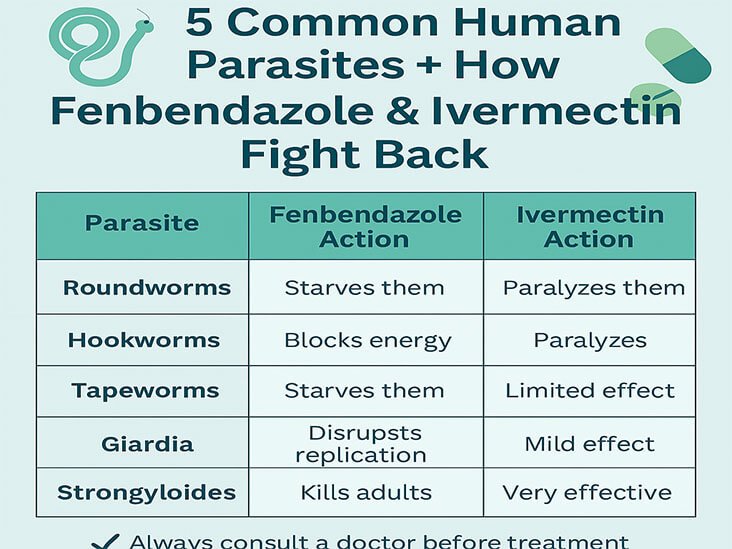How Fenbendazole and Ivermectin Work Against These 5 Common Human Parasites

Introduction
Parasites are not just a problem for pets or livestock — they can infect humans too, often silently causing symptoms like fatigue, digestive issues, and even brain fog.
Two drugs that have recently caught attention for their potential parasite-fighting abilities in humans are Fenbendazole and Ivermectin.
But how exactly do they work?
In this post, we’ll dive into 5 common human parasites and explore how Fenbendazole and Ivermectin help fight back.
What Are Parasites?
Parasites are organisms that live on or inside a host (like a human body) and feed off it, often causing harm.
The most common types of parasites affecting humans include:
- Protozoa (single-celled organisms like Giardia)
- Helminths (worms like roundworms, tapeworms, hookworms)
- Ectoparasites (like lice and mites)
Many people may be infected without even realizing it, as some parasites can live quietly for years before showing symptoms.
How Fenbendazole and Ivermectin Work
Both Fenbendazole and Ivermectin target parasites, but in slightly different ways:
| Feature | Fenbendazole | Ivermectin |
| Type | Anthelmintic (dewormer) | Antiparasitic agent |
| Main Action | Starves parasites by blocking their glucose metabolism | Paralyzes and kills parasites by disrupting their nervous system |
| Common Use | Worm infections, some off-label uses in humans | Worms, mites, lice, some protozoa |
| Origin | Primarily for veterinary use | Originally veterinary, now FDA-approved for some human conditions |
5 Common Human Parasites and How These Drugs Help

1. Roundworms (Ascaris lumbricoides)
🦠 What They Are:
Large worms that infect the intestines commonly spread through contaminated food or soil.
🧪 How Fenbendazole Works:
- Inhibits glucose uptake in roundworms, starving and eventually killing them.
🧪 How Ivermectin Works:
- Paralyzes the roundworm’s muscles, making it easier for the body to expel them.
2. Hookworms
🦠 What They Are:
Worms that latch onto the intestinal wall and feed on blood, causing anemia and fatigue.
🧪 How Fenbendazole Works:
- Disrupts the energy metabolism needed for hookworms to survive.
🧪 How Ivermectin Works:
- Interferes with the nerve signals of the hookworm, leading to paralysis and death.
3. Tapeworms
🦠 What They Are:
Flatworms that live in the digestive tract can grow several feet long!
🧪 How Fenbendazole Works:
- Inhibits key enzymes in the tapeworm’s system, leading to nutrient starvation.
🧪 How Ivermectin Works:
- Less commonly used against tapeworms, but may be helpful in combination therapies.
4. Giardia (Giardia lamblia)
🦠 What It Is:
A microscopic protozoan parasite that causes severe diarrhea, bloating, and cramping.
🧪 How Fenbendazole Works:
- Binds to parasite tubulin, disrupting cell structure and replication.
🧪 How Ivermectin Works:
- Shows some activity against protozoa, although it’s less effective than specialized anti-giardia medications.
5. Strongyloides (Threadworm)
🦠 What It Is:
A type of roundworm that can live and multiply inside the human body for years if untreated.
🧪 How Fenbendazole Works:
- Effective at killing adult worms by interfering with their ability to absorb nutrients.
🧪 How Ivermectin Works:
- Extremely effective; it paralyzes adult worms, allowing the body to eliminate them naturally.
Fenbendazole vs. Ivermectin: Which Works Better Against Human Parasites?

When it comes to fighting human parasites, both Fenbendazole and Ivermectin are popular choices, but they work differently and are suited to different situations. Let’s break down how they compare:
🧪 How Fenbendazole Works
Fenbendazole disrupts the parasite’s energy metabolism by binding to tubulin (a structural protein), which leads to the parasite’s slow starvation and death. It’s especially effective against intestinal parasites like pinworms, roundworms, and hookworms. Because it targets the parasite’s internal cellular structure, it is considered a broad-spectrum anti-parasitic agent.
Best For:
- Gastrointestinal worms
- Some protozoa (under research)
- Longer, slower treatments
⚡ How Ivermectin Works
Ivermectin paralyzes and ultimately kills parasites by interfering with their nervous system, specifically by binding to glutamate-gated chloride channels. It is extremely effective for external parasites like scabies mites and lice, and internal parasites like Strongyloides and river blindness-causing worms.
Best For:
- Scabies and lice
- Strongyloidiasis
- Onchocerciasis (river blindness)
✅ Which One Should You Choose?
- For intestinal parasites like roundworms, pinworms, and hookworms: Fenbendazole may be more effective.
- For bloodstream or skin parasites like Strongyloides, scabies, or lice: Ivermectin is usually the better option.
- Always consult with a healthcare professional before starting any antiparasitic treatment, especially when using off-label medications like Fenbendazole.
Why Are Fenbendazole and Ivermectin Gaining Popularity?
- Increased Awareness: More people are learning about parasitic infections thanks to social media and functional medicine discussions.
- Off-Label Use: Though originally developed for animals, both drugs have shown surprising success in humans (always under a doctor’s guidance).
- Alternative Health Trends: Many are seeking non-traditional solutions to chronic fatigue, digestive issues, and unexplained health problems.
Safety First: Always Consult a Doctor
While Fenbendazole and Ivermectin can be powerful allies against parasites, they are not DIY treatments.
✅ Correct diagnosis, dosage, and supervision are critical to avoid serious side effects like:
- Liver toxicity
- Neurological symptoms
- Allergic reactions to dying parasites (Herxheimer reaction)
Always work with a healthcare provider when considering antiparasitic treatments.
FAQs About Parasites, Fenbendazole, and Ivermectin
Can Fenbendazole be used safely by humans?
Fenbendazole is primarily a veterinary drug but has been used off-label under supervision for certain conditions. Human use should always be supervised by a doctor.
Which parasites does Ivermectin treat best?
Ivermectin is especially effective against roundworms, strongyloides, scabies, lice, and some protozoa.
Can I take Fenbendazole and Ivermectin together?
Combining antiparasitic medications should only be done under strict medical supervision, as it can increase side effect risks.
How do I know if I have parasites?
Common signs include digestive issues, unexplained fatigue, skin rashes, allergies, and even mood disorders. A stool test or blood test can confirm parasitic infections.
Conclusion
Parasites are more common — and more harmful — than most people realize.
Fortunately, treatments like Fenbendazole and Ivermectin offer hope for those struggling with parasitic infections.
By understanding how these medications work against roundworms, hookworms, tapeworms, Giardia, and Strongyloides, you can make informed decisions about your health journey.
As always, prioritize safety: speak with a healthcare provider before beginning any antiparasitic treatment.
👉 Ready to learn more? Stay tuned for upcoming posts about parasite cleanse diets, symptoms to watch for, and success stories!
